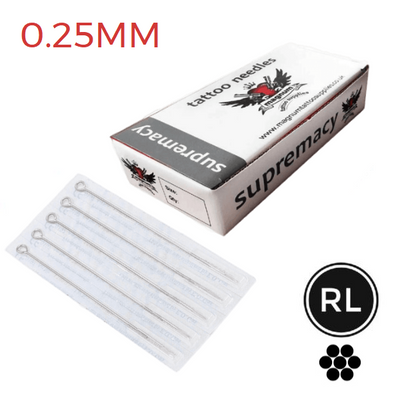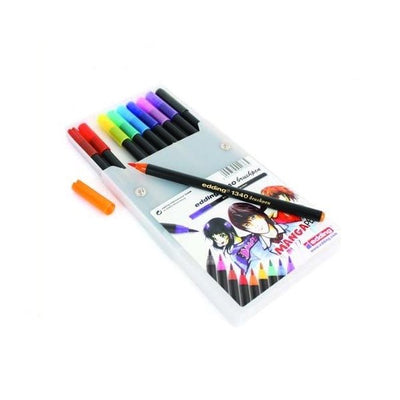Unlike the warm, sunny summer days, where tattoo maintenance might feel more straightforward, the cold, harsh winter months introduce unique hurdles. The dry, biting air can sap moisture from your skin, risking your new ink's vibrancy and health. This is compounded by the need to wear heavy, often irritating layers that can rub against and aggravate your fresh tattoo.
All these factors make winter tattoo care a tricky endeavour, requiring specific strategies and precautions to ensure your artwork heals beautifully and remains as stunning as the day you got it. So, let's dive into essential winter aftercare tips to protect your new tattoo from the season's harsh elements.
1. Listen closely to your tattoo artist's guidance
One of the most crucial steps in caring for your new tattoo is to heed the advice provided by your tattoo artist. They are experienced professionals who know how to best care for freshly-inked skin. They will typically provide you with detailed aftercare instructions, so make sure to pay close attention and ask questions if you're unsure about anything.
Your tattoo artist may recommend a certain type of moisturiser, ointment, or balm to use during the healing process. They may also advise you on how often to apply it and when to start the healing process. Following their guidance will go a long way in ensuring your tattoo heals properly.
2. Make sure to apply moisturiser to your tattoos
Winter is notorious for its dry and cold air, which can sap moisture from your tattooed skin. Tattoos, especially during the healing phase, require ample hydration to heal properly and maintain their vibrancy. Applying a recommended moisturiser or tattoo aftercare product will help keep your tattooed skin nourished and prevent excessive dryness, flaking, and itching.
Remember not to overdo it; applying a thin layer of moisturiser a few times a day, as per your artist's recommendations, is typically sufficient. Avoid using heavy lotions or petroleum-based products, as these can clog pores and hinder the healing process.
3. Regularly clean your tattoos
Maintaining proper hygiene is vital to preventing infection and promoting optimal healing. Clean your new tattoo gently and carefully using a mild, fragrance-free soap and lukewarm water. Pat your tattooed skin dry with a soft towel or you can just let it air dry – avoid rubbing or using rough clothing materials that can irritate the skin.
Avoid exposing your tattoo to excessive moisture, such as prolonged soaking in hot tubs or saunas, as this can soften the scabs and disrupt the healing process. Furthermore, avoid swimming in chlorinated pools or salt water until your tattoo fully recovers.
4. Wear loose clothing to avoid any friction
During the winter months, you're likely to wear layers of clothing to stay warm. Be mindful of what you wear over your fresh tattoo to avoid unnecessary friction. Tight, abrasive clothing can irritate sensitive skin, potentially causing scabbing and colour loss.
Choose for loose-fitting, breathable fabrics like cotton to reduce friction and irritation. If your tattoo is on an area that is prone to rubbing against clothing, consider using a non-stick, sterile bandage to protect it until it's healed.
5. Avoid exposing your tattoos to harsh chemicals or scents
Tattooed skin can be sensitive, especially during the healing process. Harsh chemicals or scents found in some skincare products, such as strong perfumes, alcohol-based lotions, or astringents, can irritate your tattooed area. To prevent potential skin reactions, use mild, fragrance-free skincare products and avoid applying anything directly onto your fresh tattoo without consulting your tattoo artist first.
6. Allow your tattooed skin to get some fresh air
While it's essential to keep your tattoo moisturised, it's also important to let your skin breathe. Whenever possible, wear your loose-fitting clothing that allows your tattooed skin area to get some fresh air. Allowing your tattoo to "breathe" can help reduce the risk of moisture becoming trapped against your skin, which may lead to complications such as bacterial growth or scabbing.
7. Keep your body well-hydrated
During the winter, the dry air can dehydrate your body, making it even more crucial to drink enough water. Adequate hydration can aid in the healing process by maintaining skin elasticity and preventing excessive dryness. Consider using a humidifier in your house to add moisture to the air and aim to drink at least eight glasses of water a day.
8. Do gentle exfoliation to brighten your tattoo
After your tattoo has fully healed, which typically takes several weeks, you can consider incorporating gentle exfoliation into your skincare routine. Exfoliation can remove dead skin cells and rejuvenate your tattoo, making the colours appear brighter and more vibrant. However, avoid over-exfoliating, as this can damage the tattooed skin. Consult always your tattoo artist or a dermatologist for recommendations on suitable exfoliation products or techniques.
9. Avoid submerging your tattoo in water
Submerging your tattoo in water, especially during the healing phase, can be detrimental to its health and appearance. Prolonged exposure to water in activities like swimming, hot tubs, or extended showers can soften scabs and disrupt the healing process. To safeguard your tattoo, opt for shorter showers with lukewarm water, and consider using waterproof coverings when necessary.
10. Resist the urge to pull at flaking skin
As your tattoo heals, it's common to experience flaking and peeling of the skin. It's crucial not to pick, scratch, or pull at this flaking skin, as doing so can result in scarring and uneven colour distribution. Instead, let the skin shed naturally, and if needed, gently pat the area with a soft cloth. Keeping the tattoo well-moisturised can help minimise flaking and itching.
11. Protect your tattoos in winter with sunscreen
Even during the winter months, protecting your new tattoos from the sun's harmful UV rays is vital. Overexposure to sunlight can cause tattoos to fade and lose vibrancy over time. To safeguard your tattoos in winter, apply broad-spectrum sunscreen with an SPF of 30 or even higher before going outside and reapply as needed. Additionally, consider wearing protective clothing to shield your tattoos from direct sunlight, especially if they are in areas frequently exposed to the sun's rays.
Why is getting a tattoo this winter better than in the summer?
- Reduced UV exposure: Winter's shorter days and less intense sunlight mean less risk of UV damage to a healing tattoo, which is crucial since UV rays can fade and damage fresh ink.
- Less sweating: Cooler temperatures reduce sweating, which can benefit the healing process. Sweat can irritate a new tattoo and may lead to infection or distorted healing.
- Easier aftercare: The lack of exposure to elements like chlorine from swimming pools and saltwater from beaches, which are more common in summer, makes aftercare more straightforward in winter.
- Protective clothing: Layered winter clothing acts as a barrier, protecting the tattoo from environmental irritants and direct contact, which is beneficial during the initial healing phase.
- Optimal healing environment: Cooler, drier weather is often better for healing than the hot, humid conditions of summer, which can exacerbate swelling and discomfort.
- Hydration of skin: In winter, people are more likely to moisturise their skin regularly due to dry conditions, which can aid in the healing process of a tattoo.
- Indoor activities: Winter generally promotes more indoor activities, reducing the likelihood of exposing a new tattoo to direct sunlight, dirt, and other outdoor elements that might hinder healing.
Winter tattoo aftercare made easy
Winter tattoo aftercare may present its own unique challenges, but with the right knowledge and precautions, you can ensure that your new ink heals beautifully and remains vibrant. The key is to strike a balance between keeping your tattoo moisturised in the dry winter air and avoiding excessive friction from clothing.
By following the tips outlined here, you can enjoy your new tattoo even in the coldest months of the year. Remember, proper aftercare is essential for the long-term health and appearance of your tattoo, so give it the care and attention it deserves.



























































 Studio supplies
Studio supplies












 Power & batteries
Power & batteries








 Aftercare
Aftercare





















 Apprentice
Apprentice


 Piercing & jewellery
Piercing & jewellery







 PMU supplies
PMU supplies




 New arrivals
New arrivals
 Gift vouchers
Gift vouchers
 Shop all
Shop all


















































